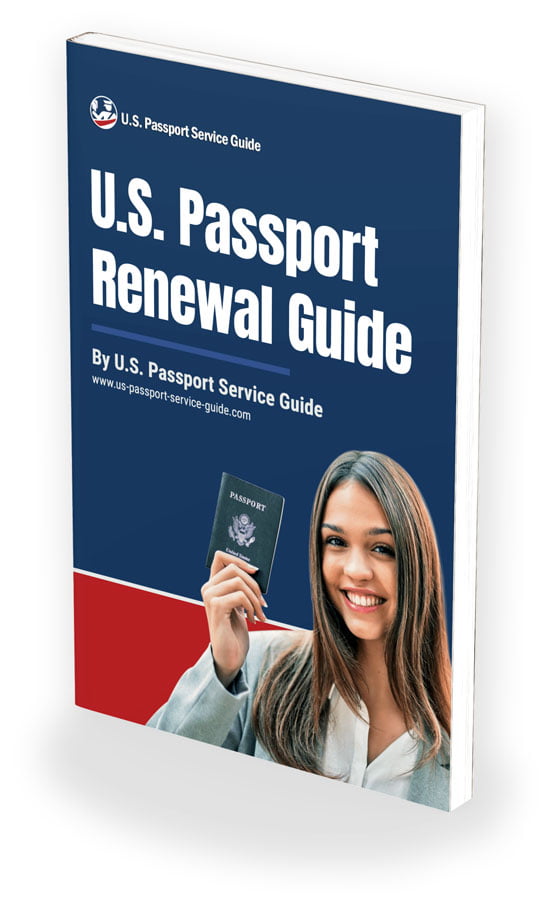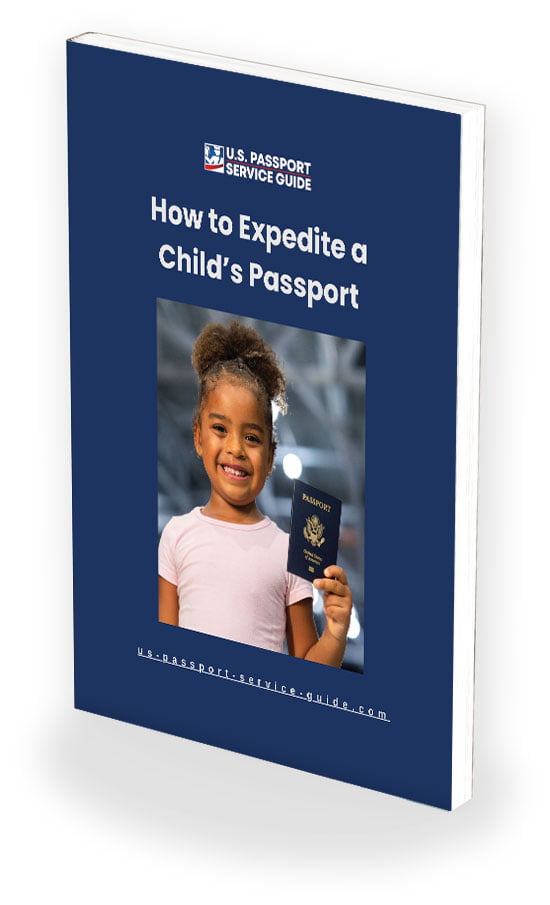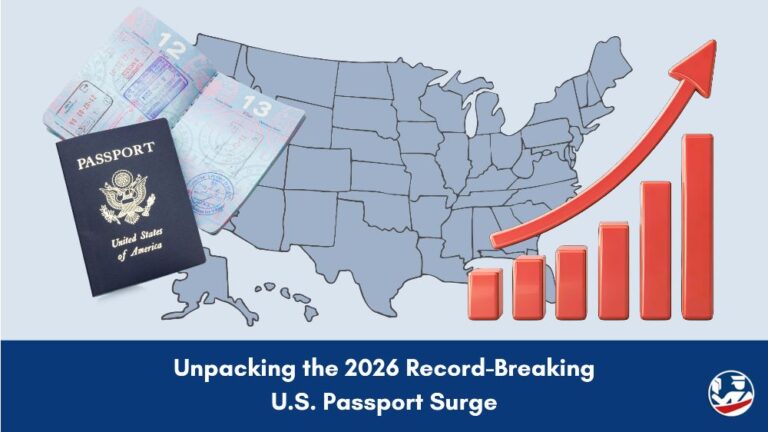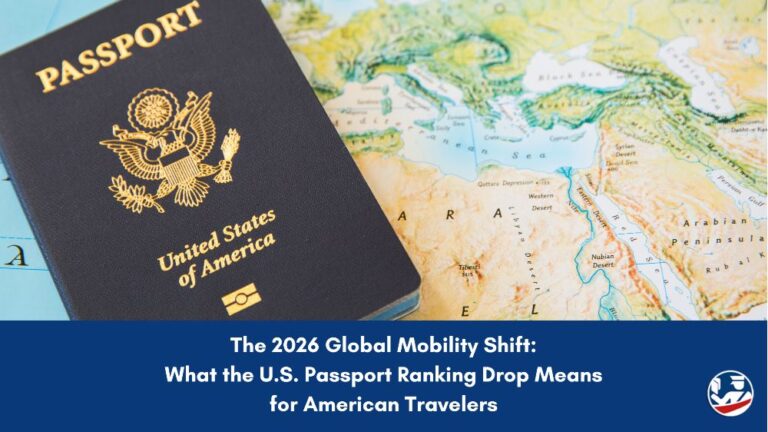To carry or not to carry? That is the question that travelers most often ask when visiting a foreign country.
In almost all cases, the best option is to keep your passport with you in a secure travel pouch.
However, the practical answer to whether it is safer to keep your passport on you at all times or smarter to keep your passport safely stored at your accommodations can vary depending on a few major factors:
- Location: Some countries require you to carry the original (not copies of) your US passport at all times. Your US passport is your most reliable form of identification, and certain countries require that form of identification to be on foreign travelers during their entire stay. If you’re in such a place, it’s best to keep your passport on you to avoid hassle or potential legal issues.
- Daily Plans: Consider your activities for the day. If you’re planning water-related activities like swimming or scuba diving, where you won’t have a secure place to lock up your passport, it might be safer to leave it back at the hotel.
- Risk Tolerance: It boils down to personal preference and how much risk you’re willing to take. Many travelers do not want to take the risk of leaving their passports behind and prefer to keep their passports with them so that they know where it is at all times. Other travelers, when not required, prefer to risk leaving their passports at their hotels or rentals and feel comfortable trusting their accommodations’ security.
Assess your situation, weigh the risks, and decide accordingly. Whether you choose to carry your US passport or leave it at your hotel, ensure that you take the necessary precautions to safeguard your passport during your trip abroad.
Table of Contents
Considerations for Passport Safety
INTERPOL’s Stolen/Lost Travel Document Database (SLTD) rates the United States as one of the largest contributors to SLTD, with an ever-growing percentage of records of lost or stolen US passports on file. In just the first quarter of 2014, 3 million of the 40 million SLTD reports came from American citizens alone. How do you prevent becoming one of these statistics? Practicing passport safety.
Passport safety refers to the measures taken to protect your passport from loss, theft, or damage during international travel. It involves careful handling and secure storage of your passport, both while on the move and at your accommodations. It also includes being aware of the local laws regarding carrying identification and following best practices recommended by travel experts. Ultimately, passport safety is about ensuring that your passport, your most critical travel document, remains both secure and accessible throughout your journey.
Here are some of the most important tips for keeping your US passport safe while traveling abroad:
Get to know your destination before you go.
When learning about your destination country, be sure to learn what is expected of foreign travelers: entry and exit requirements, local laws, and rules and regulations that visitors are expected to follow.
US citizens have a reliable travel source in the U.S. Department of State – Bureau of Consular Affairs website that provides up-to-date travel warnings, important destination information, local laws, and safety and security information for every country. Always check for the latest Travel Advisories before your trip so that you fully understand any risks for travel.
Be aware of your surroundings at all times.
When traveling abroad, you should always pay attention to your surroundings, not only to keep yourself and members of your party safe in a foreign country but also to protect your passport from getting stolen.
Theft can happen anywhere. It’s important to be aware of your environment and keep tabs on the people you’re with. It is always advisable to avoid suspicious situations, people you do not know, and lesser-known areas. Stick to places that are well-lit and tourist-friendly.
Make smart use of your technology.
Consider using technology to your advantage. For instance, you can scan your passport and store it digitally in a secure location, such as an encrypted folder or a trusted cloud service. This can be a lifesaver if you lose your physical passport and need to prove your identity.
Conduct regular checks on your passport.
Make it a habit to regularly check that your passport is where you expect it to be. Every time you stop at a bathroom or stop by your accommodations, check to make sure that your passport and important items are exactly where you last put them. This can help you quickly notice if anything is missing and take immediate action.
Passport safety is an essential part of smooth, stress-free international travel. By familiarizing yourself with your destination, staying alert, making smart use of technology, and regularly checking on your passport, you can significantly reduce the risk of passport-related issues.
Best Practices for Carrying Your Passport
When carrying your passport during your trip, take extra precautions. Your US passport is vital in proving your identity and citizenship. If lost or stolen, it can lead to serious issues like identity theft or difficulties in returning to the United States.
For this reason, choose the safest and discreet means of carrying your US passport and personal items as possible.
Always keep your passport safely hidden in a place that is only accessible to you. Carrying your passport in your pants pocket, loose in your purse, or inside a compartment with an outside zipper is just asking for trouble.
Keep your passport in an interior pocket or compartment that requires effort to access. There are many travel accessories—pouches, money belts, bags, purses, backpacks—that have anti-theft technology to keep your items safe while you’re on the move. Look for RFID-blocking technology in addition to hidden pockets and durable clasps and zippers for added protection against both pickpockets and identity theft.
International travelers consistently laud travel accessories that can be worn hidden under clothing as the most secure way of carrying a passport and travel documents. These types of travel accessories help foreign travelers avoid notice from pickpockets and thieves and allow only the person wearing them access to the items inside.
The money belt is the most highly recommended travel accessory for carrying your passport and essential travel items because it can be worn discreetly under your clothing. It is designed to hold your passport book and travel documents, and its adjustable belt can accommodate many different body types and sizes to ensure a close, comfortable fit.
- The VENTURE 4th Travel Money Belt is an excellent choice for securely carrying your passport and valuables. The slim bag has enough room for your passport, travel documents, cash, and credit cards, and can be worn securely and discreetly under your clothing. Amazon customers recommend it for its size, durability, comfort, weight, quality, security, value, and ease of use.
Other notable discreet travel accessories are belt wallets and neck wallets. Both items are recommended to be worn under your clothing for discreet protection and are designed to hold your passport book, visa, credit cards, cash, and other needed travel documents.
- Shacke’s Hidden Travel Belt Wallet with RFID Blocker is Amazon’s Choice for belt wallets. Amazon customers like this product for its size, quality, performance, weight, comfort, ease of use, and belt strength.
- Lewis N. Clark’s RFID-Blocking Stash Neck Wallet, Travel Pouch + Passport Holder is highly recommended by Amazon customers for its weight, pockets, performance, portability, size, comfort, and ease of use.
- For more of our top travel accessory recommendations, see The Best Travel Accessories for Your Next Trip Abroad.
Keep in mind that the rules and regulations of your destination country may dictate whether or not you must carry your passport with you throughout your stay. For example, Italy, France, Malaysia, Russia, and China require foreign travelers to carry their passports with them at all times as a valid form of identification.
It’s also important to think about emergencies. An urgent matter, such as a medical crisis, a natural disaster, or an evacuation, could force you to depart your destination country with little notice. These instances are rare, but they can happen. Your U.S. passport is not only your most reliable form of identification, but it is essential for your return home.
With extra precautions and a safe, discreet method of carrying your passport, keeping your passport on your person during your trip abroad is usually the safest option.
Keeping Your Passport Safe at Your Accommodations
If you decide to leave your passport and travel documents back at your hotel or rental, you must find a safe place to securely store them.
Before your trip, contact your accommodations and request information on the security and storage options. Find out ahead of your stay if you’ll have access to a safe or lock box available to you for personal use.
Most hotel rooms and rentals have safes for guests to use during their stay. The code for access is typically programmable by the guest to ensure an extra layer of safety. Make sure that you feel confident in how secure that safe is before you choose to store your passport and valuables inside—you cannot always be 100% sure that there isn’t a master key or a code that could override the combination.
If you’re not confident that your accommodations offer a reliable place to secure your personal items, you can invest in a safe lock for extra security. A safe lock combined with a padlock can be added to a common hotel or rental safe to create an additional barrier that can only be unlocked by you.
- The Milockie Brand Hotel Safe Lock is highly recommended by Amazon customers for providing an extra layer of security and peace of mind during their travels.
Most customers choose to purchase or use their own padlock or the recommended Master Lock Combination Lock with the Milockie Brand Hotel Safe Lock.
If you are feeling confident that your travel documents and personal items are safe at your accommodation, but you would like to keep your valuables together in one secure case, frequent travelers often use portable security lock boxes to safeguard their items while traveling abroad. Portable lock boxes come in a variety of sizes and are locked using either a master key or a combination lock.
- The Amazon Basics Portable Security Case Lock Box Safe is Amazon’s Choice Overall Pick due to the quality, weight, size, and portability of the lock box. This model is designed with anti-pry steel, a padded interior, a zinc alloy combination lock, and a steel cable that can be used to secure the lock box to stationery items.
Never leave your travel documents and valuables out in the open or “hidden” under the furniture or drawers of your accommodations. Your passport and valuables should always be locked away somewhere safe that is only accessible by you or trusted members of your party when those items are not on your person.
Never give your passport or travel documents to anyone for safekeeping. Many hotels and concierge services will offer to hold your luggage and personal items for you while you are out. Do not trust anyone with your passport, travel documents, or valuables.
Knowing that your valuable travel documents and personal items are safe and secured (by you) back at your accommodations will allow you to enjoy your time abroad without added stress and worry.
Expert Advice on Passport Safety
Experienced travelers and travel authorities can offer invaluable advice on how to best keep your passport and travel documents safe while traveling abroad.
We’ve compiled some of the best advice on passport security from our own experiences, other frequent international travelers, as well as seasoned travel authorities to provide you with some of the best pro tips on keeping your US passport safe while traveling abroad:
Fill out the personal data and emergency contact page in your US passport book.
If you haven’t done so already, be sure to fill out the contact information page located in your US passport book. This is the quickest way to have your passport returned to you if found by local authorities or a Good Samaritan—they’ll be able to contact you and return your passport to you.
It can also be particularly helpful in situations where you might be incapacitated or unable to communicate. It’s a simple step that can significantly enhance your safety and security while traveling abroad.
Make copies of all travel documents.
According to the United States Department of State’s Smart Traveler Tips, you should always carry copies of your US passport ID page and foreign visa with you at all times. If you are keeping your original passport book or passport card secured at your accommodations, keep copies secured on your person in an anti-theft wallet.
Additionally, take a picture of your passport ID page and foreign visa and store it safely in a zipped digital folder, an app with a passcode for entry, or email it to a trusted family member or friend.
Your emergency contacts should also have copies of your passport and travel documents in safekeeping while you are abroad.
Track your passport’s location.
There are passport wallets on the market that not only function like regular wallets with compartments for your passport, visa, ID cards, and credit cards but also contain a compartment for a GPS-tracking device.
GPS-tracking devices can be attached to or stored in items and tracked by your phone or computer. They use GPS technology to provide real-time location updates. If your passport wallet gets lost or stolen, you can access its last known location via Bluetooth or a synchronized app.
When using a GPS tracker, make smart decisions if your passport has been lost or stolen.
First and foremost, if your passport is stolen, report its last-known GPS location to the local authorities. DO NOT try to follow its location and track your passport down yourself; you could potentially place yourself in serious danger.
If your passport was lost and you can trace it to a known location, such as the restaurant you stopped at for brunch, then by all means, go back to the restaurant and let them know that you left your passport there earlier in the day.
It is also important to note that GPS-tracking devices are not foolproof. Their effectiveness can be influenced by battery life and Bluetooth signal strength. Using a GPS tracker with your passport wallet should be used as an extra layer of security, not the main line of defense.
- PASCACOO’s Airtag Passport Wallet with RFID-Blocking Technology is Amazon’s Choice for the highest-rated passport wallet with a slot for a GPS-tracking device. Amazon customers are satisfied with its quality, appearance, size, organization, value, and ease of use.
Most customers also purchased the Apple AirTag, or a GPS-tracking device comparable in size, to place inside the PASCACOO Airtag Passport Wallet.
Never store your passport in your luggage.
Your luggage is not a safe place to carry your passport. Even a locked suitcase can be broken into or simply taken. Bags and suitcases are an easy target for thieves. Whether you’re traveling to or from your accommodations with your luggage or are storing your personal items in your suitcase at your accommodations, do not store your passport in your luggage.
Keep your passport and personal information hidden at all times.
We went over the best ways to keep your personal information safe while carrying your passport, and the same rules apply when arriving and leaving your destination country. Even when standing in line for immigration and customs, never keep your passport openly displayed. Keep your passport and travel documents secure and hidden from prying eyes and hands at all times.
Develop a system or routine—and stick to it.
Whether you carry your passport with you or leave it back at your accommodations, create a daily routine. A routine will make sure that you never leave your passport or important documents out in the open or behind.
If you are carrying your passport and personal items, use the same secure method to carry them, such as a money belt, and make sure that you pack and wear that accessory in the same way every day of your trip.
If you are using a lockbox or safe, create a habit of checking it at the same time every day.
Having a set routine and system in place for your passport and personal items will mean that you have one less thing to worry about when you walk out of your hotel room or rental. You’ll know that you have everything you need with you and that the items left behind are safe and secure until your return.
These expert strategies will undoubtedly help safeguard your US passport and personal information, thereby ensuring a smooth and secure travel experience.
What To Do If Your Passport Is Lost Or Stolen
Nothing ruins an international trip like losing or having your passport stolen. It can be a daunting experience, particularly while staying abroad. The good news is—you can get help and a new passport even when you’re abroad!
In a Reddit “Ask Me Anything” Q&A, then-Managing Director for Overseas Citizens Services in the Bureau of Consular Affairs at the State Department, Michelle Bernier-Toth was asked:
“What advice would you give to someone who loses their passport and possibly all identity while traveling?”
Michelle Bernier-Toth responded:
“Contact the nearest embassy or consulate. We can help! … We can offer emergency services very quickly. For example, if you lose your passport, we can issue an emergency passport on the same day. Some services take more time because of legally mandated processing requirements.”
The U.S. passport replacement process, similar to applying for a new US passport, involves:
- reporting the loss (if your passport is lost or stolen, report it immediately to the nearest US embassy or consulate, or at 1-877-487-2778),
- filling out Form DS-11: Application for Passport
- filling out Form DS-64: Statement Regarding a Lost or Stolen Passport
- gathering necessary documents, and
- making an in-person appointment at a U.S. Embassy or Consulate.
Note: A reputable passport expediting service can also complete many of these steps on your behalf. This can be especially helpful if you need to get a replacement passport, but do not want to spend your time abroad in a US embassy waiting area.
It’s vital to act swiftly to prevent identity theft and misuse. For a detailed, step-by-step guide on this process, including all of your options for reporting the loss and replacing your passport, refer to our Comprehensive Guide to Replacing a Lost Passport.
In every case of a stolen passport, start by filing a police report, which is crucial for documenting the theft and protecting against identity theft. Then, follow the same steps as for a lost US passport.
Remember, if your US passport has been lost or stolen, you cannot travel until you have been issued a valid replacement US passport.
For more information, see the U.S. Department of State’s Lost or Stolen Passports Abroad page.
The Choice Is Yours. Make the Smartest One.
The question of whether to carry your passport with you or leave it at your hotel while traveling abroad depends on various factors such as your destination’s laws, daily activities, and personal choice. It’s essential to consider and assess all of the factors involved and take necessary precautions to ensure your passport’s safety throughout your journey.
By being prepared and adhering to best practices, travelers can enjoy a smooth and secure international travel experience.
Safe travels, Laura
Disclaimer: This Passport Guide offers step-by-step instructions from the U.S. Department of State and tips from the U.S. Passport Service Guide for informational use only. We’re not liable for any issues arising from this information. While we’ve tried to ensure accuracy, errors or omissions may occur, and any oversight is unintentional. Our website, https://www.us-passport-service-guide.com, earns from qualifying purchases through affiliate links without extra cost to you.
More Information and Travel Resources:
- Travel Warnings 2024
- 4 Benefits of the Smart Traveler Enrollment Program (STEP)
- Our Top Travel Safety Tips
- Safer Travel: Destination-Specific Travel Safety Information
- Passport and Visa Fraud – U.S. Department of State – Bureau of Diplomatic Security
- Form DS-64: Statement Regarding a Lost or Stolen Passport
- How to Expedite a New Passport Application: A Complete Guide









